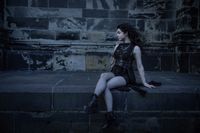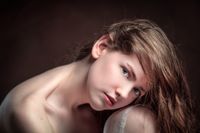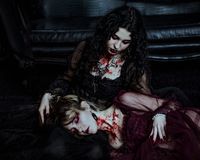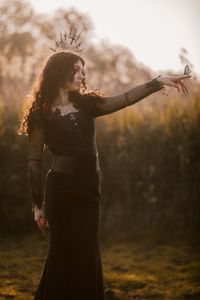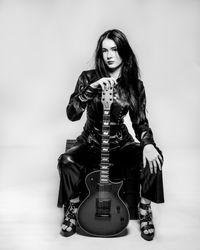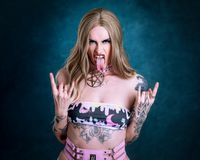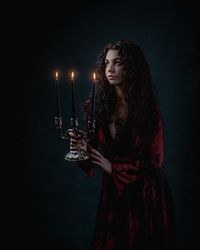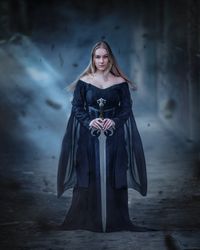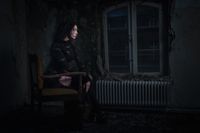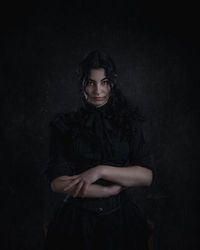Interview (with the vampire)
Een tijdje geleden werd ik gevraagd om een interview af te nemen, welliswaar in het Engels, maar gelukkig kunnen de meeste van mijn volgers dit wel lezen, en anders is translate een prima uitkomst denk ik zo.
Voor wie het interesseert hier onder de versie die ik heb ingediend, dus mocht deze ooit nog bewerkt of gecensureerd worden, deze is dat niet.
Ik zal wel weer wat mensen tegen het zere been schoppen, maar hey, het is wat het is.
-------------------------------------------------------------------------------------------------------------
Please tell us about yourself, how you got started with/in photography and what type of formal training you had.
I’m Frank Dinnissen, probably no need to mention, but I am a photographer. But besides that I am a father to the most amazing son I could have imagined.
I’m based in a small town, which I have to call city otherwise I will end up pissing off the residents here. I’ts called Grave, not pronounced as the English word for a burial place.
How I got started. If I take it back to the very core, I started with my fathers camera at a very young age. I can’t remember the specific brand or model but I think it was a Minolta, analog camera with interchangeable lenses. Taking pictures of random things like our dog, my toys, or nature. I was an outdoor kid, still am actually.
My first real photographic experience in terms of my current work started out at quite young age as well. My girlfiend at the time was a career model, actually one of the very few alternative styled models her age at that time. Her photoshoots were as I would call it now basic fashion jobs, comparable to current e-commerce. Please mind this was before social media, mainstream use of the internet, and cellphones with camera’s built in. Yes, I am that old.
Most photographers shot film, eventhough digital devices were available.
She absolutely loved being in front of the camera, but found the jobs she had to do boring, there was no challenge. The same thing I see in e-commerce, which I have shot for quite a while.
We asked her father for a camera to take along on our days out. Without knowing anything about the technical side of a camera, we took pictures together.
My job was pressing buttons, no more no less. She was more or less my teacher in terms of talking to a model, how to approach things, and how to incorporate my own ideas or vision into my work. At that time I literally just tried stuff. Unusual angles and trying to move along with her as she was doing her posing work. I literally had no idea what I was doing. But the excitement when we could pick up the developed pictures when we shot film was always a highlight of the week. We switched to digital, because her father told us that would save him thousands on yearly basis in film and development.
We just took pictures we wanted to take, there was no real idea behind it, no very thought out theme. But it was good fun. We didn't take these pictures to get published, or to show the world. We just took them for us, because we loved it.
Took me a while to understand the camera, since i had no formal training. Never had actually, not even in later years.
But i am a good learner, if something takes my interest, i can and will teach myself trough pain and heartship to get to an ok level. So i am self-tought.
At a certain point we developed our own sort of workflow. We never intended to, it just happened. It's like music, one provided the melody the other the beat. (Yes thats a song lyric too)
We used her parents house as a "studio" a lot. Big house with all kinds of inredible decor. Later on we just went places. Not even with the intention of taking pictures, if we didn't we didn't. But we usually did.
It was creating and preserving memories. After her passing, i havent touched a camera in many years. Eventually i just started to go out with a camera again, to capture random things.
And by doing just that, i got lucky to score a job for a fashion company by being in the right place at the right time, and having the guts to go ask a few models who had a photoshoot if i could snap a few shots of them.
For some reason the manager liked what i showed him on my camera, and i got invited to come and do a small photoshoot for them. That was my way into the fashion industry in a nutshell.
Tell us about the challenging part or general challenges in photography.
I think photography at this point in time has gone to it’s absolute low in terms of it being a viable source of income. Not for everyone, and there are still a good amount of established photographers and creatives out there who make a great living out of their job. But for newcomers or photographers who don’t really stand out it’s just being another pod in an oversaturated market. Smart phones have played a part in this, because photographers are the pixel peepers, the average person doesn’t see or care to see if you can count every eyelash on someone’s face. And they do a big part of the creative work for you. Applying filters, adjusting colors through built in software, retouching, or add filters to an image automatically.
Anyone can press that button, just like anyone can shoot any camera on auto-mode.
Camera’s became fairly cheap and mass produced over the years. You’re basic Canon, Nikon or Sony starts around $300, kit lens included. So in general especially if you buy a used one, can afford a starter or semi professional camera, and start shooting.
Photography is one of the strangest hobbies I know, because it quickly turns in to “How can I make money out of this?” for most people. Potential clients get adverts and posts thrown at their face on social media, one even cheaper than the other.
I’m not one of the “purists” who thinks this is destroying my market. If someone wants to make $10/$100 from taking someone’s family pictures go for it. What I am saying is that photography became more generally available to the masses, so the challenge is to stand out enough for people to see your worth over their smartphone or friend who happens to own a camera.
Social media is another challenge. Not to post your work there or get seen. But more because this Instagram crap, turned everyone into a model. Mind you, I believe anyone can be a model if they want to, but someone getting 10.000 likes on a picture doesn’t make them a model. This industry caused a shift from models needing a skill, to models needing likes, or a name. Having the daughter of a famous basketball player in a campaign “sells” but that has nothing to do with being a skilled model, but having a name. Making horrible models get the most jobs. They have no clue on how to put emotion or expression into their work, they don’t know how to walk or pose, they just get a bunch of likes over showing “booty” or having a name. No skill needed. If there was no Instagram or social media nobody would have ever heard of them. In a nutshell the demise of the art industry. And the challenge of competing with people who only know how to stick a booty in your face and predominantly men who boost their exposure by liking or commenting on only that kind of content.
Side note, sex work is real work, and i support people who choose this as their profession. But it is something else than modeling work or art. And having a name or an attractive body or face doesn’t mean you have an actual skill in the art or modeling industry.
Can you describe your photographic style, and how you have developed this style.
It’s about genuine feeling or emotion, mine or the model’s, preferably a combination of the two. Something that tells a story just by a single image, and the implementation of cold tones and desaturated colors in general. Here and there I create something with more color, but even in these cases I tend to remove or desaturate some or all colors.
I have big love for a darker style in my work. All my best work in my opinion has a darker look or theme.
What is it you wish you knew before you started with photography?
That you don’t need to work with everyone, that you don’t need to please everyone, that it’s ok to say no, that I would be better off without a lot of people who want to work with me and just choose who I want to work with/like to work with best.
What does a photographer's day look like for you?
Taking it back to when I was doing this full-time, waking up, morning coffee or mostly a soda in my case, answering e-mails and messages, overview the schedule of the day, make as many preparations as possible for the first photoshoot of the day, but I usually do that the end of the day beforehand, shooting work, breaks included, wrap up the shooting work and load all images in my digital library, edit, prepare for the next day and repeat.
Among your work, which image is your favorite and why?
I don’t have a one single favorite, I have quite a few. It’s not a competition, so there is no ranking or a definite number one.
The things I like most are more or less all in the same kind of style, same kind of colors, same model.
It’s like a favorite song, I have quite a few favorites, but it depends on which day you are asking me for my favorite song.
Are there artists who have influenced or inspired your work?
Yes, many. And they still do.
But not in a way of “I want to shoot what they shoot” or “edit the way they do” or anything like that. I did make a few attempts at recreating a certain style or look when I started out with creative photography. Mainly because I was figuring out my style. Dark, moody, edgy. That’s what I knew. But I had no idea on how to actually create that in terms of making an image, editing and use of props and extra’s. So I started looking around for things that caught my eye. And that generally ended up being something darker themed or with a darker almost colorless look.
Something fantasy themed usually caught my eye rather quickly. Dark princesses, witches, warlocks, demons and mystic creatures, people with a flamboyant outfit to match the theme. Usually paired with some special effects added in real life or edit.
It just took me a while to start realizing there is no right or wrong in this. I figured a certain style of editing and shooting made this genre work. But I think I have found a way to incorporate elements I like, but keeping the image in my own style and not lean towards someone else’s work.
What motivates you to continue taking pictures? [financial, emotional, political, economical, intellectual}
Definitely no financial reasons any more. I came to a point where I just want to create my shit with the people I want to create that with. I found it very hard and sometimes boring or frustrating having to create exactly what I client wants. If I have almost no hand in the outcome, I am literally just pressing buttons or re-creating someone else’s idea or work.
Not saying I exclusively shoot exactly what I want, I still shoot things certain people talk to me about. And that’s more than fine, because I just enjoy working with them, and I don’t have any doubts in whether there will be good results or not, I know they will be cool.
But there is no pressure in any way, no pressure because getting paid for a job, not because someone demands me to work a wonder, and that works, at least for me it does.
My happiness and the happiness of the people I work with are the motivation. And it’s all up to our personal wishes, boundaries, energy or motivation how much we do, what we do and within what time frame.
We can work extremely hard and keep on shooting, but It’s also fine if we know we got what we want and chill for the rest of the day.
Fun motivates me.
What is it that cliënts expect from you or other photographers? Are the expectations always reasonable?
Depends on the client, there is no real one single expectation they all have.
Some clients are already happy if you take three test shots, some clients will never be happy. No matter what you do, how many pictures you take or will deliver, no matter how great they look in your pictures.
From my personal experience, it’s usually the clients who are shooting with you because your price is the lowest, who are usually ending up being unsatisfied or asking for more. They are usually there because they want something someone else has created but they want it done at the cheapest price, because their dream photographer has a bigger price tag. And you will not deliver exactly what their dream photographer would, because it is not your style/work/within your capabilities.
I have had a client who did not want to do anything besides standing on one spot, slouching, not wanting to work on posing, or basically move at all.
Her only comment was, you’re the photographer, just make me look good, you can photoshop it, so I am not bothered putting in any work. I am paying you for this, so do your job.
So yes, sometimes demands or expectations are wild.
What is the best advice given to you by another photographer?
Stop looking at other peoples work in envy, start looking at your own work and just go shoot what you love and have fun doing so. Don’t get caught up in shooting out of the need for content, or because of a competition you have with yourself, or for other people in general.
What advice would you share with other creatives?
Create your shit. Create what you want and love.
What is the one thing you need to capture in a picture?
Eyes. That’s what makes or breaks a picture in my opinion. Unless its something faceless of course.
[P] Among your work we can see a variety of styles, some of which lean towards or are (artistic) nude. Readers often call it an intimate form of photography. What are your thoughts on this?
Intimate is a broad way of saying or thinking. People who think intimate in a sexual way are wildly mistaken. But it’s definitely a more personal form of photography. Someone gets to see you in a way most people don’t. So in my mind there has to be a big amount of thrust involved.
If we can leave parts of the body covered I always say just leave them covered, it wont show in the picture there is no need to remove it in real life, and in some cases things are so easy to photoshop out, I can’t be bothered to ask a model to remove a certain piece of clothing.
Besides that, I always make sure I have tape or pasties laying around, I’m not there or interested to see more than I need to.
[P] You're hosting workshops, how did you get to this point and what motivated you to do so?
I love the part where I can teach someone techniques, or add to their existing skillset. In photography as well as modeling. I think my approach in both cases is very different than most of the workshops and masterclasses I have seen or heard about.
I just try to ‘Dumb things down’ as much as possible. The less technical side of photography, but show the human side that anyone can learn.
No numbers. No calculations, no gimmicks or tricks.
Just plain and simple do this, achieve that.
It started by a photographer messaging me, asking if I could show her how I captured a certain image. What camera, what lights, how I worked with the model, and she said I will pay you whatever you need and cover all expenses.
I was quite hesitant, because there was no way I could recreate the exact same image. So I explained, that part of my workflow is freestyling, so it would never be the same thing again. It also depends on things I mentioned before, my and/or the model’s mood, energy, etc. etc.
But she understood, and just wanted to see my workflow. And so I gave my first workshop.
[P] What kind of advice would you give to either photographers or models before they decide on attending one of your workshops?
If you are narrow minded, you should save your money and not attend my workshops. If you think the “rules” of photography have to be followed in any image, (crop, framing, rule of thirds etc.) save your money and don’t attend my workshops.
Attend if you want to expand your workflow and skillset, and get an insight on how I look at and create light and how I work with a model to achieve my look.
[P] What is your starting point before you proceed with any photoshoot?
Depends on what type of shoot. Sometimes there is no starting point besides the plan of driving in a certain direction and we’ll see what we can create. Other times the starting point is a location, a theme, an outfit, or a style of light.
[P] How can we imagine a photoshoot with you when it comes to interaction with the model?
Depends on who the model is. There is no set in stone way of how to work with a model. It’s more based on feeling what someone needs, and knowing what they are comfortable with or what makes the comfortable.
I need to know the model’s boundaries, for instance, no lingerie or less, or I don’t like it when someone stands close to me, or anything else. That’s the starting point usually.
I always start the shoot with a simple talk, I don’t want someone to come in and rush to work. I explain what I am going to do, and I keep telling them what I am doing during the photoshoot. For instance, I am changing some settings on my camera, or this is just a test shot.
I show them what I mean by physically doing a pose myself if needed.
But I am not going to explain my entire workflow, since there are workshops for that.
Models I work with regularly know I have the utmost respect for them and I won’t do something very unexpected, so I tend to explain less.
Even if they are friends, when the camera is pointed at them, I’m the photographer, they are the model, and we treat things in a more professional way. Doesn’t mean its less fun, it just means business and hanging out are separated. This way we get the shots we want fairly fast, after that we can just talk random stuff or go picnic for all I care and have a good laugh.
But these are the people that don’t expect me to play a role, I can just be me. That makes things much more relaxed.
Since we don’t expect anything, there is no pressure, besides the one I put on myself because I don’t want to disappoint them.
Usually that is gone fast, because we usually manage to create a great shot in the first 10 minutes or so.
I’m much less pushing on posing or expressions, because I know they will appear by letting the model freestyle around a certain angle or spot, or look I give or show them. And if needed because I see something that would compliment the image, I will ask them to adjust the pose or move a little, or put a certain feeling into their head to create an expression or look.
But usually they seem to know exactly what to do without me having to tell an hour long story.
[P] What is a good picture? When are you happy with your work?
Eyes and expression mostly, and with a wider (half or full body shot) a pose that matches the expression. But that’s created the other way around since I believe a good model creates a pose, and feels what that pose is doing to their body and mind and expresses that trough their eyes.
This is definitly a parsonal favorite. One of the first pictures that made me internally scream (in a good way) in a long time.
[P] What distinguishes photographers who develop successfully from others who don't?
Their own unique style, that is not another 13 in a dozen picture.
What do you want to achieve photographically in the next few years?
Shoot my shit some more with the people I love to work with.
What do you like to do in your personal life when you are not taking photos?
Take care of my son together with my wife, and work my regular job.
Is there anything else you would like to mention?
Keep shooting your stuff, regardless of what other people think.
The extra story for my website, that won't be published in the interview.
What i have noticed when learning photography the way i did.
When i started out, nobody told me what to do, or how to operate a camera. Sure that went by trial and error. Lots and lots of error.
However, there was not one single restriction put on me in any way or by any one.
The moment i got involved with other and highly educated photographers, in came the restrictions. Because here are the "Rules" of photography.
Composition, where to place your subject in your frame, lighting and how to "properly" light an image. How to crop and how not to crop.
People litterally critique'ing an image i absolutely loved to bits. "You can't do that angle" "You need to reposition the person in the picture" "You can't cut of the hand, it has to be in the shot or it needs to be cropped above the elbow"
Sure, these rules are fine guidelines, especially if you want to shoot a basic or classic portrait.
"The focus HAS to be on the eye nearest to the camera" up to the point where photographers went into editing that one beautiful shot, but the focus was slightly off that eye, and just oversharpened that eye to death, because of someone's rule, or actually someone's restriction.
People who know me, know i try to shoot for details, but if a picture is that nice to look at and it makes me scream internally about how beautiful it looks, the little lack of sharpness on that specific eye has no real maning to me anymore.
The more people tell you what to do, the more you start overthinking. It just kills your creativity.
I have been stuck for a while, because i kept refering to rules, or other peoples work, or people telling me what i need to do and what i shouln't do.
Especially with cliënt shoots, there was this miniature voice (not really, but as a matter of saying) telling me, do this or do that, because their photography friends, or if it was a model who was the cliënt, other photographers who get to see your shots will tear them apart with critique. More pleasing others than doing what i love doing.
Rembrandt light is a very good example, its beautiful, no doubt about it, but certain people are just stuck in it, it's all they do because that's the way am image should be lit. Or any other type of style of lighting. Using it over, and over, and over and yes, over again. And the "excuse" is always the same. "Yes but that'smy style"...... Yes, but it's the same damn picture over again, maybe a different person, or outfit or color, But it's the same. Because at some point, someone, told you, this is what you need to do. Maybe it was you, telling yourself that. Doesn't matter who told you. But you're stuck.
Why do i need to light like Rembrandt? I'm not him, i'm me.
He provided me with an insight on beautiful light, and i incorporate it in my work sometimes, but i don't have to.
I have the power to place my light anywhere i want, i can place it in my backyard and shoot a model three towns away, it won't do shit, but i can though....
"Light has to come from above"
Let me tell you, i have lit images from the ground up with a single light pointed directly at the model, and they look dope! Completely BS lighting, completely against every law of lighting. But they look good! So, why should i light from above? For someone who thought up that rule? For other photographers? See where i am going?
Just let me be that kid who got a new toy car for his birthday, who starts flying it trough the air, or driving it under water or vertically up a tree, without thinking if that is what needs to happen or what is normal.
In my studio, or on my shoot location cars fly, upside down, and they are piloted by unicorns who fart rainbows that smell like gumballs. You just have to deal with it.
But i have to be honest, i would have NEVER tried to do the lighting i did, without people who told me, you do whatever you feel is right, and if it's shit, it's shit. I'll pose for it regardless. And they bare with me during my cussing session on my lights, making sure what i want is going to work out one way or another.
Or we just give up, if it's not worth our energy. Because that is fine too, and that took me years and years to realise.
So, thats another reason for me to work the way i do.
Let's wrap this up with another favorite image, That was lit in the most unusual way for fine art imagery. Created by slapping the biggest umbrella i could fit in the room, pointed in the most unusual direction, just because i had the freedom to do so. In other words this would have never existed if i followed the basic rules.
